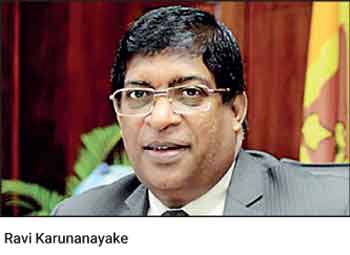Monday Feb 16, 2026
Monday Feb 16, 2026
Saturday, 1 June 2024 01:14 - - {{hitsCtrl.values.hits}}
 Sri Lanka’s economic policy continuity and macroeconomic stability will be crucial to achieve robust growth in the next five years, former Finance Minister Ravi Karunanayake reiterated outlining the outcome of the Economic Transformation Bill. The bill aims to transform Sri Lanka into a highly competitive and export-oriented digital economy by including diversification and deep structural changes of the national economy
Sri Lanka’s economic policy continuity and macroeconomic stability will be crucial to achieve robust growth in the next five years, former Finance Minister Ravi Karunanayake reiterated outlining the outcome of the Economic Transformation Bill. The bill aims to transform Sri Lanka into a highly competitive and export-oriented digital economy by including diversification and deep structural changes of the national economy
The stability and probability of consistent economic policies should be indispensable for fostering long-term economic growth, he said.
The Economic Transformation Act will be enacted to spearhead these objectives, potentially leading to the establishment of an Economic Commission replacing the current Board of Investment (BoI) which was in existence for 45 long years. The New Economic Commission is to be set up under this act replacing BOI and its control over free trade zones will be consolidated under its purview.
Furthermore, control over trade zones under the Board of Investment and newly established trade zones will be consolidated under this commission.
The commission will be empowered to oversee economic activities and international trade and govern both existing and newly established trade zones, ensuring cohesive and effective management of economic initiatives and investment infrastructure.
Karunanayake noted that BOI restructure has become an urgent need as its archaic procedure and official red tape had been an obstacle for attracting foreign direct investment and policy consistency is one of the key requirements to attract investments and promote exports.
With the failure of plans and strategies due to official inefficiency and bungling, the BOI has become a burden for the State as a dormant institution after over four decades of poor performance in its role of investment facilitator
It is now acting as an intermediary rather than facilitator and the board has no clear record on foreign investment projects and the actual value of investments
It has been observed that the granting of tax exemptions was one of the BOI’s main functions until the responsibility moved to the Ministry of Finance (MOF) in 2011.
Since the establishment of this export promotion entity 45 years ago, the institution has managed to attract over US $ 20 billion in Foreign Direct Investment (FDI), official data showed. It has been observed that the average annual FDI inflow has merely been $ 500 million.
Another main accounting practice of the BOI was the inclusion of foreign loans to Direct Investment Enterprises in annual FDI while publicising dollar earnings of existing free trade zone enterprises.
The bill will provide provisions for the National Policy on Economic Transformation and for the establishment of the Economic Commission of Sri Lanka, Investment Zones, Office for International Trade, National Productivity Commission, and Sri Lanka Institute of Economics and International Trade, and for the repeal of the Board of Investment of Sri Lanka Law No.4 of 1978 and other matters connected.
To reinforce domestic productivity, a National Productivity Commission will be established, recognising the imperative of enhancing local products to remain competitive globally. The establishment of an Economic and International Trade Institute is underway.
The transformation of the country’s economy is essential. The country has to make a paradigm shift from a domestic economy to one focused on exports he claimed.